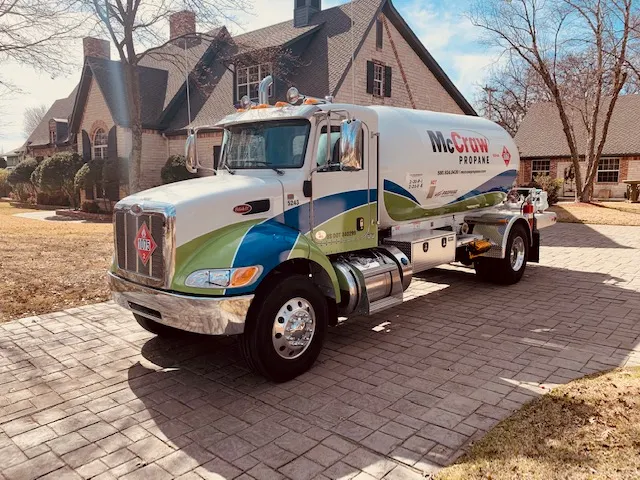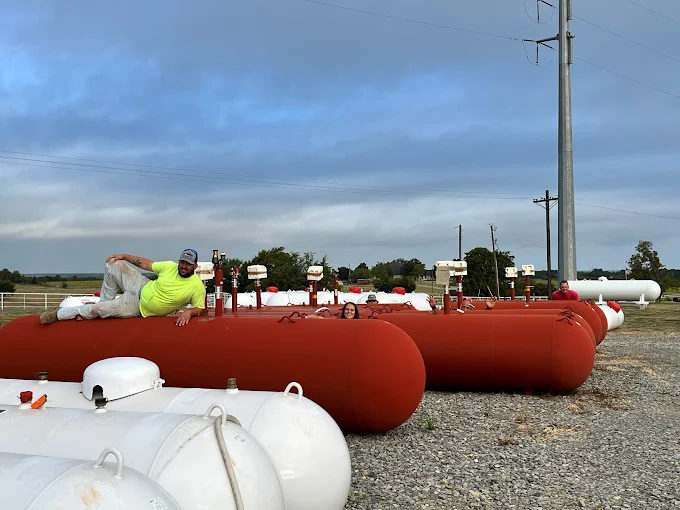Refer a friend and earn $50!
Here's howPropane is an efficient source of energy for powering homes. Its versatility makes it a great fuel for heating, cooking, and powering appliances in your home while conserving energy, lowering emissions, and saving you money on energy costs.
You’ll need the proper propane tank to use propane in your home properly. Most people have lots of questions about buying their first propane tank—you’ll need to know the right tank size, type, and installation process for your needs, but it’s hard to do that without the help of a professional.
That’s where McCraw Oil and Propane comes in. We’re well-versed in propane tanks and can help set you up with the right size propane tank, proper installation, and reliable deliveries for your fuel needs.
As a propane supplier, we’ll work with you to come up with a delivery schedule, easy payment process, and be here for you in emergency situations—you can count on us for your tank and fuel requirements.

What Propane Tank Should I Choose for My Home?
Finding the right size propane tank for your home depends on your energy use, available space, and how quickly you’ll need to refill.
From small, portable tanks to large permanent ones, each tank size serves a unique purpose. Here is a breakdown of common propane tank sizes to help find the right propane tank size for you.
20-Pound Propane Tanks
These are the most recognizable propane tank sizes. You’ll often see these in a backyard hooked up to a grill or portable heater.
A 20-pound propane tank can hold about five gallons and is best for small, short-term use, such as grilling, patio heating, or camping.
These tanks are portable, easy to exchange or refill, and don’t require professional installation. However, they aren’t designed for whole-home use or major appliances.
33-Pound Propane Tanks
Slightly larger, a 33-pound propane tank holds about eight gallons of fuel. While still portable, this size is often used for small commercial equipment like forklifts or temporary heating for job sites.
These tanks are more for niche uses in residential applications. This is a good option if you need more capacity than a 20-pound tank but aren’t ready for a stationary tank.
100-Pound Propane Tanks
This is the next step up for homeowners. 100-pound propane tanks hold about 24 gallons of fuel and are commonly used to fuel one or two home appliances like water heaters, fireplaces, clothes dryers, or cooking ranges.
These tanks are often installed in pairs or multiples to support moderate residential use. However, they still require manual filling and are not ideal for whole-home heating.
Placement regulations apply, including minimum distance from doors, windows, and ignition sources.
420-Pound and 100-Gallon Propane Tanks
These tanks are the same, though they have different names. They hold about 96 gallons of propane when filled to 80% capacity, which is a safety standard.
100-gallon propane tanks are great for medium-sized homes that have multiple propane appliances like water heating, space heating, and cooking.
They’re usually installed vertically and are a great middle-ground for homeowners who need more fuel storage without committing to a larger tank. These are ideal for households using around 200–300 gallons of propane per year.
500-Gallon Propane Tanks
A good choice for whole-home propane usage, 500-gallon tanks are designed for house heating, water heating, cooking, and even generators. They hold about 400 gallons of usable fuel and reduce the frequency of refills.
This size is best for medium to large homes that use a substantial amount of propane throughout the year. These residential propane tanks are typically installed underground or above ground with permanent placement and require professional installation and adherence to local codes.
1,000-Gallon Propane Tanks
For large homes or rural properties with high-demand appliances like pool heaters or backup generators, a 1,000-gallon tank is the best fit.
These tanks can hold up to 800 gallons of usable propane, offering a long-lasting supply and fewer deliveries. They are ideal for properties with very high propane consumption, and require more space and investment but offer more convenience and peace of mind, especially in colder climates. They are often underground tanks.
The right residential propane tank size for your home depends on how much propane you use, the size of your home, usage patterns, and how often you want to refill. If you’re unsure, consult a local propane supplier—they can assess your needs and help when choosing the right propane tank size to keep your home running efficiently and safely.
Why Choose McCraw for Your Home Propane Needs
When it comes to heating your home and powering your appliances, you want a propane provider you can count on. That’s where McCraw Oil and Propane stands out. With decades of experience serving Texas communities, McCraw combines expert service, dependable delivery, and local knowledge to offer a propane experience you can trust.
McCraw has been in the energy business since 1972. That kind of longevity doesn’t happen by accident—it comes from doing the job right, time and time again. From helping you select the right propane tank size to maintaining your system for long-term performance, McCraw’s team of certified technicians and propane specialists brings the know-how you need for safe, efficient energy use.
At McCraw, you’re more than just an account number. The team takes pride in building relationships with every customer, offering friendly, responsive support whenever you need it. Whether you’re calling with a question, scheduling a tank installation, or just need a quick delivery, you’ll talk to a real person who’s ready to help.
No one wants to run out of propane—especially in the middle of winter. McCraw offers automated delivery options that monitor your usage and ensure your tank stays full year-round. It’s one less thing to worry about, and a big part of what makes McCraw so reliable.
McCraw is committed to providing only high-quality propane and dependable delivery—on time, every time. When you choose McCraw, you’re choosing quality, safety, and peace of mind.

Safety First: McCraw’s Commitment to Safe Propane Use
Propane is a safe and reliable energy source when installed and used properly. At McCraw Oil and Propane, safety isn’t just a priority—it’s a promise. We follow the highest safety standards in the industry and help ensure every customer understands how to use propane responsibly.
Propane systems must comply with rigorous safety codes, including NFPA 58: Liquefied Petroleum Gas Code, which outlines the national standards for propane storage, handling, and installation.
In addition to national regulations, every city and county may have its own building permits and requirements. That’s where McCraw’s local expertise really shines—we know the ins and outs of every local regulation and take care of the permitting process for you.
Our technicians are trained and certified in propane tank installation with precision and care. Once installed, we offer regular inspections to ensure everything is running safely and efficiently. From checking tank pressure to inspecting regulators, valves, and lines, we ensure your system stays in top shape.
Safety doesn’t stop after installation. McCraw offers:
- Clear guidance on how to operate your propane system
- Tips for leak detection and emergency shut-off
- Instructions on what to do if you smell gas
Whether you’re new to propane or a long-time customer, our team is here to keep you informed and protected—because peace of mind is part of the package.
Efficiency You Can Feel
One of propane’s biggest advantages is its efficiency. When compared to other fossil fuel sources, propane delivers more heat per unit, burns cleaner, and powers your home more cost-effectively—especially when you partner with McCraw.
Propane-powered appliances are highly efficient, often outperforming their electric counterparts:
- Propane hot water heaters can heat twice as much water in the same amount of time
- Propane furnaces often operate at 90%+ efficiency levels
- Cooking with propane appliances offers better temperature control and faster results
- Heating systems, such as gas fireplaces and patio heaters, offer highly efficient operation
That means you’re using less energy while still getting powerful, consistent performance.
Instant and Reliable Power
Need heat or hot water in a hurry? Propane delivers instant heat—no waiting around for systems to warm up. And it keeps your home running smoothly even during power outages when paired with a backup generator. No interruptions, just comfort, and reliability when it matters most.
A Cost-Effective Solution
Propane offers excellent value from installation to daily use. Tank installation is often more affordable than other fuel systems, and because propane burns so efficiently, your fuel lasts longer—saving you money over time.
Environmentally Friendly
Using propane can also reduce your home’s carbon footprint:
- Produces fewer greenhouse gas emissions than electricity from coal or oil
- Emits virtually no sulfur dioxide
- Non-toxic and doesn’t contaminate soil or water
How long does a tank last
A properly installed and maintained propane tank can last for decades—typically between 20 to 30 years, and sometimes even longer. However, the exact lifespan of your tank depends on several key factors, including the material it’s made of, whether it’s installed above or below ground, the environmental conditions it’s exposed to, and how well it’s maintained over time.
Most residential propane tanks are constructed from heavy-duty steel, which is built to withstand high pressure and resist damage. Steel is strong and durable, but it can begin to rust over time, especially if the protective coating is compromised. Some smaller tanks are made from aluminum, which is naturally resistant to corrosion, but those are generally used for portable applications like grills or forklifts rather than whole-home propane systems.
Above-ground tanks often have a long service life when placed in a location with mild weather and good ventilation. Tanks are more prone to corrosion in regions with heavy rain, snow, or high humidity, particularly if the outer paint wears away. Sun exposure can also degrade the protective coating, so it’s important to keep the tank clean and repainted when needed. Routine inspections can catch small issues before they become big problems.
Underground propane tanks are designed with extra layers of protection. They’re coated with special anti-corrosion materials and often paired with anode bags to help prevent rusting. Still, soil composition and drainage matter. Wet, clay-rich soils can accelerate corrosion if not properly managed, while well-drained, sandy soils are easier on tanks over time.
Contact Us With Propane Tank Questions
Propane is the best choice for your fuel needs, and we’re here to make the tank buying or leasing process easy for you. Contact us with questions if you’re in the market for a tank today.
